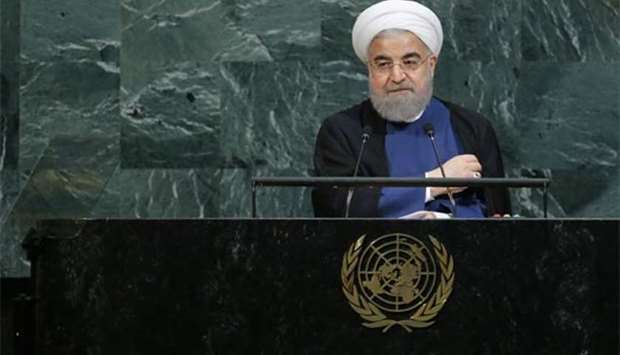Iran's President Hassan Rouhani insisted on Wednesday his country has complied with the nuclear accord it signed with six world powers, and warned "rogue newcomer" Donald Trump that the United States faces isolation if he tears it up.
Addressing the UN General Assembly one day after the US president appeared on the same podium to launch a blistering attack on both Iran and on the 2015 accord, Rouhani warned the fate of the deal cannot be decided by "one or two countries.""It will be a great pity if this agreement were to be destroyed by rogue newcomers to the world of politics. The world will have lost a great opportunity," Rouhani told the world body.
"By violating its international commitments, the new US administration only destroys its own credibility and undermines international confidence in negotiating with it or accepting its word or promise."
But, outside the assembly chamber, there were signs that America's allies -- while still opposed to abandoning the accord -- may be prepared to countenance additions to it to appease Trump's concerns and save the agreement.
France's President Emmanuel Macron repeated his support of a deal that European capitals firmly believe remains the best way to prevent Tehran's Islamist regime from developing a nuclear weapon.
But he admitted "we have to add two or three pillars."
These measures should include "one to better control ballistic missiles and ballistic activities" and another to prolong the agreement beyond 2025, when limits on Iran's nuclear enrichment will start to expire.
A possible third pillar would involve "open discussions with Iran about the current situation in the region."
Macron's suggestions came in response to the US argument that Iran has broken the spirit of the nuclear deal by continuing to develop ballistic missiles and to fund and train "terrorist" groups around the Middle East.
'Sunset clauses'
They would also address what US Secretary of State Rex Tillerson calls the "most glaring flaw" in the deal -- the so-called "sunset clauses" that will allow Iran to resume uranium enrichment in stages after 2025.
It was not clear whether renewed discussion about extending the deal will be enough to convince Trump to endorse the accord before he is due to report to the US Congress on October 15 to certify Iran's compliance.
Trump told reporters: "I have decided. I'll let you know what the decision is."
The parties to the 2015 nuclear deal were to meet later in the day, providing a venue for a tense first encounter between Iran's Foreign Minister Mohammad Javad Zarif and Tillerson.
The stakes are high. If the US Congress decides to reimpose economic sanctions -- despite the concerns of fellow deal signatories Britain, China, France, Germany and Russia -- the agreement would likely collapse.
Asked whether Trump would withdraw the United States from the deal, the US ambassador to the United Nations Nikki Haley said that was a decision for the president alone.
But, in an interview with CBS News, she added: "What I can tell you is that if he does not certify he certainly has grounds to not do that."
US allies in Europe, along with many of Trump's critics in Washington, fear this could trigger a new Middle East arms race and diplomatic crisis even as the world faces an aggressive nuclear-armed Pyongyang.
Assembly delegates are still reeling from Trump's threat to "totally destroy" North Korea, and if America is blamed for tanking the Iran deal, Trump may find it hard to cajole Kim Jong-Un into a diplomatic solution.
EU foreign policy chief Federica Mogerhini met US Vice President Mike Pence late on Tuesday and argued that the deal is working and that Iran has been found to be living up to its commitments by nuclear watchdog the IAEA.
"Iran is delivering on its commitments," Mogerhini told Pence, according to her office. "It is therefore important that a full and effective implementation of the deal, in all its parts and by all parties, continues."
Trump did not hold back in his own General Assembly address on Tuesday, sending his clearest signal yet that he intends to torpedo the agreement.
"Frankly, that deal is an embarrassment to the United States, and I don't think you've heard the last of it -- believe me," he declared.
Several of Trump's advisers, including Tillerson and Haley, have argued that Iran's ballistic missile tests and support for "terrorist" groups around the Middle East breaches the "spirit" of the deal.
Rouhani rejected this, condemning what he said was "the ignorant, absurd and hateful rhetoric filled with ridiculously baseless allegations that was uttered before this august body yesterday."
The IAEA says its inspectors have found Iran in technical compliance with the restrictions imposed on its nuclear program, but it is for the deal signatories to decide if the accord is broken.
Aside from the United States, the other signatories have signaled support for keeping the deal, even if European capitals share Washington's concerns about Iran's subversive activities in the Middle East.
After Rouhani, the highlights of Wednesday's second day of leader speeches at the UN assembly were to include Japanese Prime Minister Shinzo Abe and Britain's Theresa May.
Myanmar's second vice president, Henry van Thio, is also due at the podium, at a time when his government is accused of driving more than 420,000 minority Rohingya from their homes.

